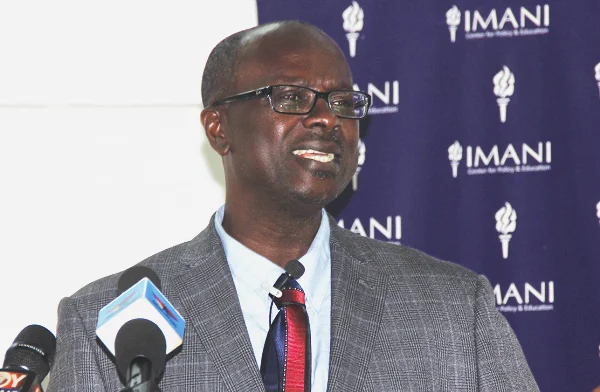Professor Stephen Kwaku Asare, a Democracy and Development Fellow at CDD-Ghana and an accomplished legal scholar, has strongly criticized what he described as needless theatrics in judicial reasoning when dealing with bail applications.
His intervention follows Circuit Court Judge Bright Acquah’s decision to deny bail to Bono Regional NPP Chairman, Kwame Baffoe, popularly known as Chairman Abronye, who is facing two counts of misdemeanour. The judge justified his decision by citing national security concerns.
Prof. Asare, widely known as Kwaku Azar, questioned why some judges choose to deliver what he called “literary performances” instead of simply applying the law as required.
According to him, bail hearings should be among the most straightforward exercises in criminal procedure, requiring no more than a clear statement of the facts, a statement of the law, an application of the law to the facts, and a conclusion.
“Why can’t our circuit judges keep it simple? Instead of entertaining us with Orwell, Mugabe, or tortured claims of ‘consistency’—such as saying I remanded Ankrah for insulting the former President, so I must remand Abronye for accusing the IGP—a judge faced with a bail application only has to do four things: state the facts, state the law, apply the law to the facts, and conclude. That’s it. Four steps. Nothing more.”
Professor Stephen Kwaku Asare,
Prof. Asare stressed that the facts in bail applications are rarely complicated. In Abronye’s case, he explained, the facts are plain: the accused is facing two counts of misdemeanour based on statements he made during a public broadcast, he applied for bail, and the prosecution opposed the application. Nothing more should be read into it, he maintained.

The legal scholar argued that judges go astray when they import concepts not provided in the law, such as “national security threats.” He pointed out that the Criminal Procedure Code itself, specifically Section 96(5), lays out the only permissible grounds for denying bail.
These include situations where credible evidence exists that the accused might abscond, interfere with witnesses or the conduct of investigations, or commit the offence again.
“Bail is the default position unless one or more of these conditions are proved. Those are the only grounds. Not Orwell. Not Mugabe. Not judicial consistency. Just those three”.
Professor Stephen Kwaku Asare
Hypothetical Examples
To illustrate his point, he offered two hypothetical examples of how bail applications should be handled with brevity and clarity. In one case, a public figure who lives in Accra has honoured police invitations in the past and presents no evidence of being a flight risk or interfering with witnesses should be granted bail, subject to conditions.

In another case, an accused person with a track record of threatening witnesses or failing to appear in court, where credible evidence suggests they may abscond or obstruct investigations, should be denied bail.
“Quick. Clear. Predictable. Judgments should not be stages for literary display or political theatre. They should be grounded in the law and the facts.”
Professor Stephen Kwaku Asare,
Prof. Asare expressed concern that when judges stray into unnecessary diversions—quoting authors like George Orwell or referencing leaders like Robert Mugabe—the credibility of the judiciary suffers.
He observed that public trust in the courts diminishes each time citizens perceive judgments as being influenced by political undertones or judicial dramatization rather than strict adherence to the law.
“Every time a judge strays into Orwell or Mugabe, public trust in the courts shrinks. When judges stick to Section 96(5), justice is done and seen to be done.”
Professor Stephen Kwaku Asare,
He urged the judiciary to be mindful of the broader implications of its reasoning. In his view, judicial opinions should not compound the public’s comprehension challenges by introducing unnecessary analogies and rhetorical flourishes.

“We have our comprehension issues, Don’t compound them with Orwell and Mugabe.” Prof. Asare’s remarks add to the ongoing public debate about judicial independence, consistency, and accessibility.
While judges are tasked with interpreting and applying the law, the legal scholar insists that simplicity and fidelity to the statutory provisions should always take precedence over stylistic expressions.
For him, the measure of judicial excellence in bail applications lies not in eloquence or political posturing but in clarity, brevity, and predictability.
“Justice must be seen to be done in the clearest and most unambiguous terms,” he said, emphasizing that adherence to the law is the surest way to protect the integrity of the courts and strengthen public confidence in Ghana’s justice system.
READ ALSO: Apostle Safo Kantanka Confirmed Dead



















